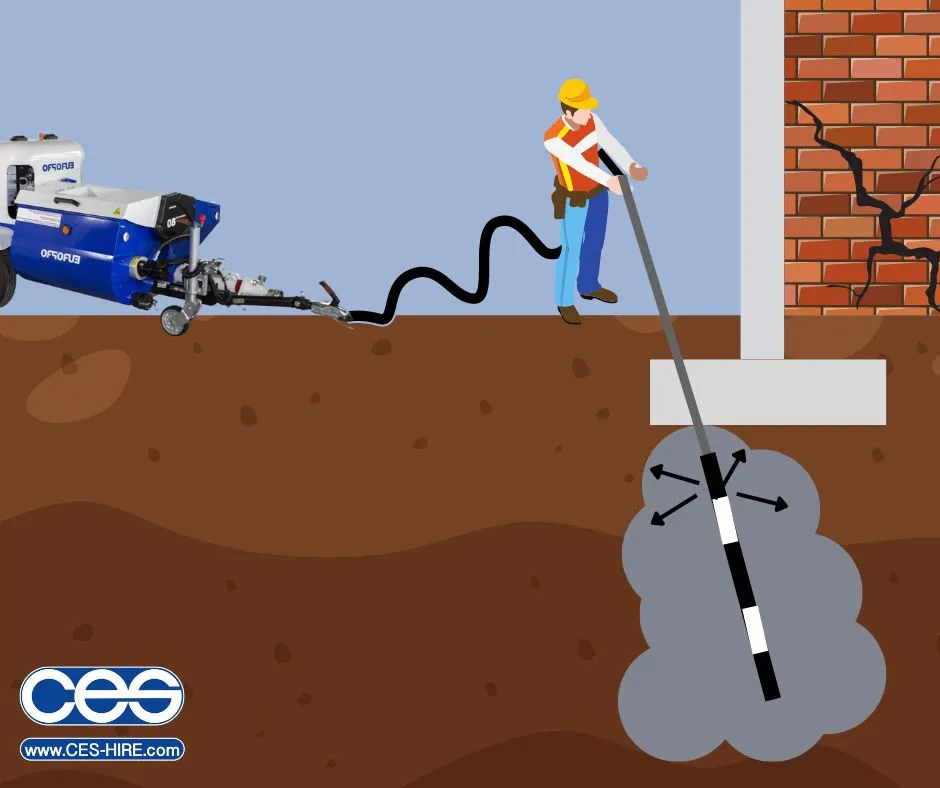What Is Grouting?
Most people have heard of grouting when it comes to tiling a bathroom but grouting within the construction realm is possibly less well known. However in some ways this is a smaller scale way to begin. Grouting in the tiling sector is about filling, bonding and sealing the joints/gaps between each tile. Grouting within engineering is a much larger scale filling of cracks and voids as well as sealing joints and openings and like tiling grout, will also ensure waterproofing qualities. Grouting injects pumpable materials into masonry structures, soil or rocks to improve the structural integrity of a building by providing a solid base to underpin it.
What Is Grout Made Up Of?
Grout is an incredibly strong substance when set and needs to be in its capacity to strengthen foundations. It is always worth remembering that it is easy to add to more grout but almost impossible to remove. Grout can be made up of sand, cement and water plus additional elements such as chemicals and fine gravel which adds to its strength. It can be a tricky material to work with that needs the correct machine.
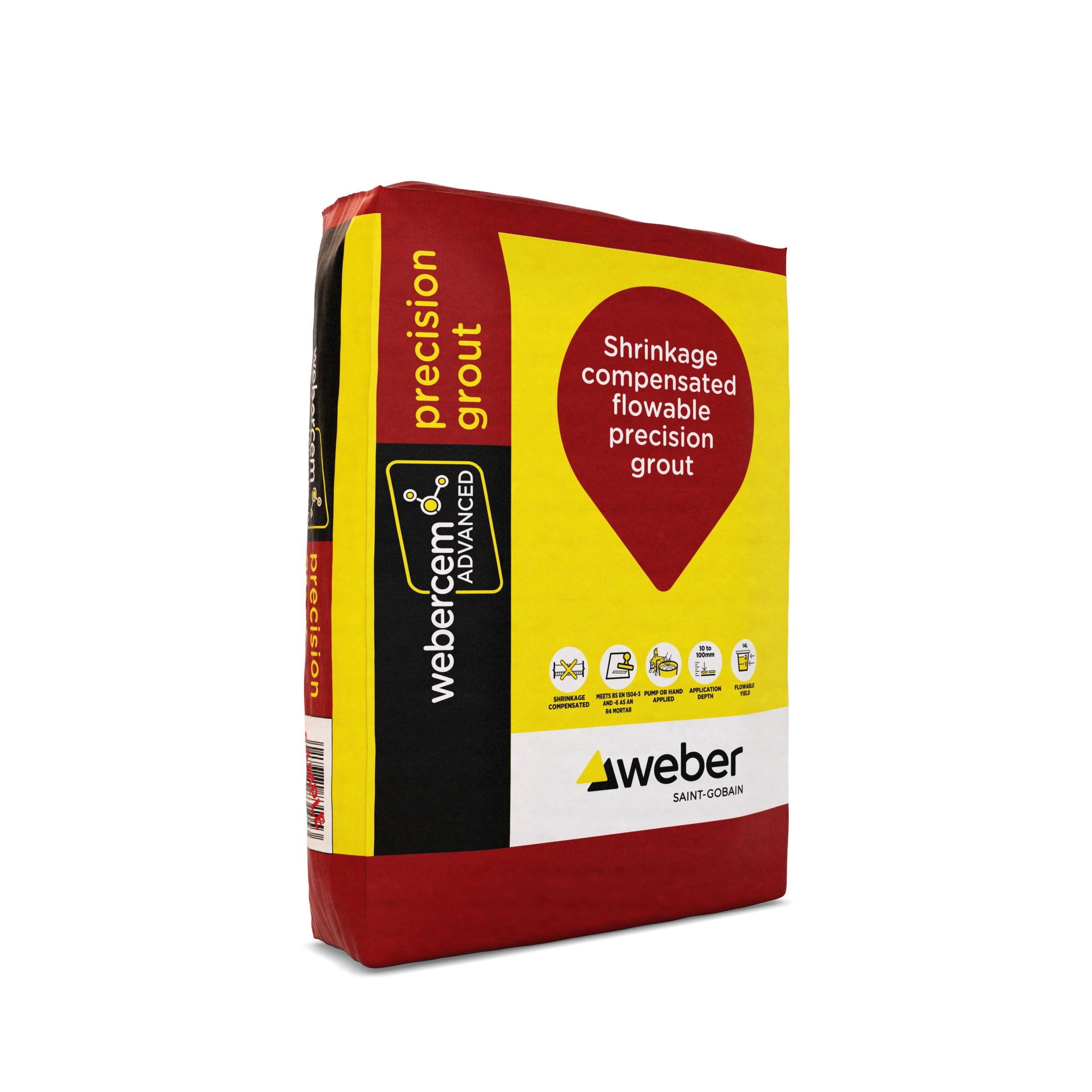
Types Of Grout
Cement Grout : A combination of cement and water or a mixture of sand (4 parts) to cement (1 part). The viscosity of the material can be increased by reducing the water-to-cement ratio. Cementitious grout is used for high-permeability ground and is an inexpensive option.
Bituminous Grout: This process can also be called asphalt grouting and the product can be likened to roofing tar. This type of grout is injected into fine sand and can create an impermeable barrier to water. The soil strength is not increased but is ideal for forming cut-off walls beneath dams or other water-bound structures.
Resin Grouts: Resin grouts is a low-viscosity material that will penetrate fine sands. The type of resin you opt for depends on the chemical content of the local water table which will also have an impact on the curing time. Examples of resin-based grouts could be tannin-based grouts, phenol-formaldehyde or resorcinol formaldehyde.
Chemical Grout: This type of grout is highly viscous and is perfect for medium -coarse soils. Sodium silicate and calcium chloride are mixed to form a gel which is applied either by a two-shot or one-shot process. The two-shot method means pipes are driven into the ground and one chemical is injected followed by the second causing a reaction and rapid soil-strengthening. The one-shot process is where the chemicals are mixed prior to the injection which delays the hardening and allows wider borehole spacing.
Bentonite Grout: A grout comprising of bentonite which is highly absorbent and will swell up and increase in volume. It is a clay-like texture which doesn’t solidify like other grouts therefore can be a temporary measure and is easily dug up again. It has thixotropic* properties and is a highly-water resistant gel and when mixed with additives can create a permanent barrier to water. This material can be used when soil particles are too small for cement and is the perfect solution to prevent seepage in alluvial** soils or beneath the foundations of dams or water-based structures.
*thixotropic- the property of certain gels or fluids that are viscous (thick) under normal conditions, but flow (become thin, less viscous) when shaken, agitated, or stressed.
** alluvial-a deposit of clay, silt, and sand left by flood water in a river valley or delta.
Grout will generally come in a premixed powder form which simply requires water and mixing. It can then be poured or pumped as it has a flowable consistency that can be adjusted to make it more/less viscous as required. Grout should have no issues of separation or bleeding and is designed with chemicals to compensate/ prevent shrinkage.
Popular cement grouts include:
- Portland cement grout
- Microfine cement grout

Aggregate Size
Grouts can contain an aggregate of anywhere between a fine 0.5mm to a coarse 6mm. Aggregate in the form of sand or fine gravel is needed to add bulk to the substance and increase strength. The thicker your material/aggregate size, the more powerful your machine will need to be (e.g. a large diesel pump). In order to pump, your material should be pourable/flowable. The ratio of water to cement should be 0.35 with a minimal amount of sand added to prevent blockages. Always refer to the product information or check with your grout supplier. It is particularly important when working with large aggregate, that the mix is graded down (this means there is also smaller aggregate within the grout) to ensure the mixture bonds together correctly. Without the graded downmix, it is likely your grout will separate under pressure and the cement and stone will not form a homogeneous bond.
What Is A Grout Pump?
A grout pump is a machine that fills a void with pumpable material to improve strength, durability or waterproofing qualities. They come in a whole range of sizes and machine specifications so it is important to be clear on what you require from your grout pump and the type of job you are carrying out. You should always select the material for the project initially and then match your machine to your material and amount you are pumping; CES can always help with this.
Types Of Grout Pumps
Grout pumps are available in a wide range of sizes and power sources but generally fit into the four categories of...

Hand Pumps

Electric Pumps

Diesel Pumps

Air-Driven Pumps
Pump types can also include piston, helical rotors (worm drive pumps) and peristaltic pumps. The pressure of a pump determines how far/ high a machine can pump. Lower pressure outputs can save you money as they are cheaper machines however for certain jobs such as grouting tunnels or repairing sewer lining, you will need high-pressure. Piston pumps tend to produce high pressure and rotor-stator pumps can vary in their pressure and output according to the choice of rotor and stator.
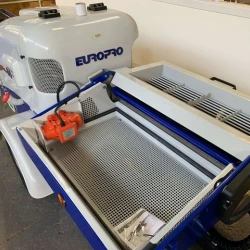
Rotor Stator Pump
This is the most common type of grout pump we stock at CES and for more advice specifically on rotors and stators take a look at this blog. A rotor-stator or worm pump works by the product being directed through the rotor and stator by cardan shaft. The rotor (the helical/spiral steel shaft) creates conveying chambers as it turns inside the rubber-lined tube that is the stator. The conveying chambers move in the direction of flow creating a continuous flow which pushes the material through the hose. Different rotors and stators achieve varying speeds and pressures so you should select yours depending on your material and aggregate size. At CES, all our Euromair Grout Pumps are operated by a rotor and stator mechanism. Shop our Rotor and Stators here.
Peristaltic Pump
This type of pump can also be referred to as a tube pump. The name derives from the biological term peristalsis which is a series of muscle contractions that move food through the digestive system. In a similar method, the rollers compress the hose or tube as they rotate which in term creates a vacuum and pushes the material through. The InoBEAM M8 is an example of a peristaltic pump sold and hired at CES. This process means that the product being pumped is kept separate to the pump mechanisms meaning less risk of contaminating moving parts with the solidified product.
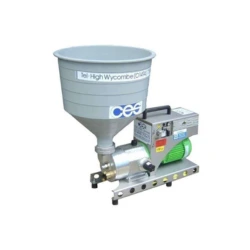

Hand Pump
A hand pump is manually operated so the process is entirely controlled by the operator. A good example of this is the Airplaco Handy Grout HG-9. This lightweight and compact grout pump is ideal for projects where space is limited or there may not be a power supply. Hand pumps are very accurate since the pressure/output is controlled by you. They can be good for smaller, more intricate jobs such as levelling concrete slabs, filling a crack or grouting a door frame as well as for use on old/delicate structures.
Diesel Pump
Just like electric machines, diesel pumps have the capacity to grout for larger projects. Diesel pumps will be utilised for the largest of projects or to cope with a larger aggregate size. CES stock a range of diesel grout pumps for hire and purchaser including the Euromair X-Pro D80 and the Putzmiester SP11 TMR and LMR.
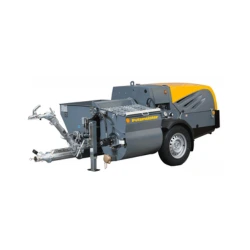
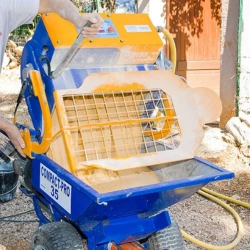
Electric Pump
Both electric and diesel pumps are great options for larger scale projects since they have a higher output which is controlled by the machine. These types of pump can pump both vertically and horizontally more quickly. Examples of electric grout pumps include the InoBEAM M8, the Euromair DropPro 8P and the Euromair Compact-Pro 30. Electric pumps are available in 3 Phase 400v, single Phase 240 volt and 110 volt.
Discuss Your Requirements With CES Hire
Our expert team is on hand to help you with any queries you have. Whether you:
Have a question about one of our products
Want to find out more about our maintenance services
Or simply need some advice
The CES Hire team can help! All you need to do is fill in the form provided and we will be in touch as soon as possible.
What Is A Grout Pump Used For?
Grout Pumps are mainly used in the infrastructure industry to ensure structural integrity. The material also provides excellent waterproofing qualities, particularly useful when building below ground where there can be a risk of groundwater as well as an increased risk of cracks. Read more here.
Common grout applications include...
Manhole, tunnel and sewer lining; preventing water hazards in underground structures
Floor restoration and raising up sunken floors
Filling voids and removing holes in concrete blocks
Linking prefabricated concrete sections
Sure-up hollow door and window frames
Rehabilitation of historical structures
Levelling pavement slabs
Laying new tiles and floor finishes
Stabilising walls
What Are The Advantages Of Grouting?
There are many benefits to grouting starting with the range of applications a pump can be used for, including ground stability, waterproofing and many more (as listed above.) Grouting can be a superb alternative to piling since it can be cheaper and also causes minimal disruption to the surrounding landscape, soils and structures as there are no vibrations.
Other advantages to grouting include:
→ The perfect solution when access is more difficult→ It’s easy to apply and fast-setting
→ It creates a maximum area of support with minimum disruption
→ It can be used on a variety of types of land/soil
→ Improves structural stability
→ Can be used for minor/intricate projects e.g. slab-jacking as well as much larger excavation projects
→ Provides waterproofing qualities
Are There Any Downsides?
It is always important to carefully assess the ground or structure you will be working on prior to carrying out your project. You must also refer to the product specification as well as machine manuals before doing any grouting to minimise risk.
Disadvantages to grouting can be:
- For small jobs it may not be so cost-effective
- If soils are particularly soft and therefore there is risk of soil movement, it may not be so well–suited.
- With pressure grouting the grout will always take the easiest route through the ground and can also find its way into unwanted areas seeping into cracks, voids and drains.
Pressure Grouting
Pressure grouting is a type of injection grouting that can also be referred to as permeation, penetration or cement grouting. This method of grouting is typically what CES machines will undertake.
The main difference with pressure grouting as opposed to other types of grouting is the type of grout that is used as the grout is a low-viscosity, fluid-like substance which flows easily. The flowable grout is injected into subterranean voids which permeate/ absorb into granular soils to achieve a strengthened mass. If the soil/ ground is highly-absorbent the grout will flow easily and a cement-water mix can be used however if the ground is less absorbent you may find you need to use a more expensive resin-based grout.
Pressure grouting will stabilise, strengthen and reduce permeability in the surface it is injected to. Pressure grouting will stabilise, strengthen and reduce permeability in the surface it is injected to.
In crowded towns and cities where space is limited, building upwards or excavating to go downwards into basements, pressure grouting is a superb option for stabilising the ground. It is an easy process to carry out in awkward spaces and also avoids extensive excavation work.
Other Types Of Grouting
Whilst pressure grouting is most popular with CES grout pumps there are a range of other types of grouting.
Compaction Grouting
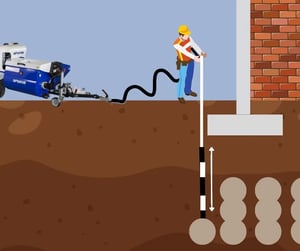
With compaction grouting, you pump grout through 2-4” injection pipes to pre-set depths. This type of grouting can also be known as low-mobility grouting as it does not flow as with pressure grouting. This grout is stiff and mortar-like and will remain in one mass forming solid spherical bulbs which push the surrounding soil to one side and therefore achieves compacted ground and increases the ground density. It is pumped at a high pressure however must be controlled so as not to over-compact and damage the ground. It can be pumped as slowly as 2㎥ per hour for more delicate groundwork. Read more.
Rock/ Fissure Grouting

This type of grouting is carried out on the fractures/joints within rocks to reduce permeability. It is frequently performed on dams or tunnels. The grout is injected to preset pressures, volume and flow rate using computer-piloted mixing and pumping equipment.
Jet Grouting
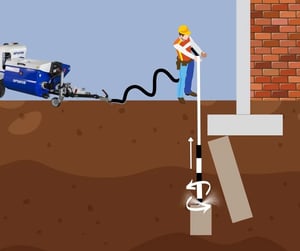
This is a particularly high-pressured form of grouting in which a ‘jet’ or grout, water or air (or a combination) disrupts the ground to erode the soil while injecting grout in via a jet monitor. The grout combines with the soil to create ‘soilcrete.’ As a result, you are left with cemented columns. This is a more costly form of grouting compared to pressure grouting however it has the benefits of no material disposal, can be used around obstacles and doesn’t disrupt normal operations.
Fracture Grouting

This type of grouting may also be referred to as compensation grouting. This type of grout is a flowable low-viscosity grout which splits through the ground by hydraulic fracturing and penetrates into the fractures. The soil besides the fractures becomes densified however not to the extent that compaction grouting achieves.
How To Use A Grout Pump?
Since there are many different grout pump applications such as applying grout to an existing structure or starting from scratch by grouting for ground stabilisation, there will be many variables in how to use a grout pump. You should always ensure a qualified pressure grouting contractor assesses the project. You will need to consider additional aspects such as the hose size, output pressure, capacity of mixer and hopper, vertical limits and power supply. When it comes to pressure grouting (CES’s more popular method of grouting) a general explanation of the process is as follows:
Grout is injected under pressure through planned points. It is injected via single port or multiple port pipes. To allow permeation of the ground it is important to match the grout particle size and the void size. You will always pump at the lowest elevation first, withdraw the pipe and repeat pumping the grout at a higher elevation until you reach the surface.
Hoses are also an important element to consider when pumping grout. Try to keep pumping distances to a minimum with hoses running as straight as possible. This reduces the build-up of back pressure and enables a better flow. The hose diameter can also affect the output. If it is too small it will restrict the flow at the outlet increasing the back pressure and reducing efficiency. If a longer hose is required due to the power supply, we would recommend starting with a larger diameter hose and reducing to a smaller hose (using a Reducer) closer to the point of grouting.
Cost Of Grouting?
There are three areas to consider when costing up a grouting project.

Material Cost

Machine Cost

Labour Cost
Materials
Firstly, let's dig into the material cost. This of course can be project dependent as different scenarios will require different types of grout. The cement grout will generally be the cheapest option and chemical grouts are a more expensive alternative. As an approximate guide for a pourable mix, each 25kg bag produces approximately 14.0 litres of grout (71 bags per cubic metre). When using a trowel able mix the yield is 13 litres. (77 bags per cubic metre). For estimating purposes, 5% extra should be allowed for spillage during mixing and placing. This amount can vary between products. The cost is also going to depend very much on the amount of grout you need. Large groundwork projects will incur an entirely different cost to repair delicate cracks on a historical structure.
As a starting point here are some popular cement grouts and their costs:
| Product | Purpose | Cost (per 25kg bag) |
| Blue Circle Mastercrete Grey Cement | Gives the following benefits compared with ordinary Portland cement: lower water demand, more cohesive mix, less tendency for water to segregate and bleed and enhanced resistance of hardened concrete or mortar to freeze/thaw attack. | From £8.81* ex. delivery |
| Fosroc Conbextra HF | High-flow, non-shrink, cementitious grout for grouting of gap thicknesses 10 to 100mm. | From £25* ex. delivery |
| Fosroc Conbextra GP |
high-flow, non-shrink, cementitious grouting of gap thicknesses 10 to 75mm. | From £15* ex. delivery |
| Weber 5-Star Grout |
Premixed cementitious grout is developed for applications where an economical grout with good flow and strength is required. Ideal for grouting bearings, precast units, floors, fixing anchor bolts, balustrades, crash barriers and starter bars. | From £38* ex. delivery |
| Webercem Eco |
Premixed, non-shrink cementitious grout developed for applications where a cost-efficient grout with adequate flow and strength is required. | From £12* ex. delivery |
| Sika Grout 111 GP |
One part, easy to use, ready to mix, flowable shrinkage compensated general purpose cementitious grout that can be pumped or poured into place. | From £17* ex. delivery |
| Sika Parex CS Grout |
Portland cement-based products giving high strength, good flow and non-shrink properties. Placed grout gives structural support and good vibration resistance. | From £23* ex. delivery |
*All costs inclusive of VAT and correct as of March 2023
Labour Cost
It is challenging to place a cost upon labour since there are so many variables. Location can play a major part in the cost of labour and you may find in cities the cost can be higher where there is greater demand. You will also find cost can be dependent on experience of the contractor as well as the nature of the job; if there are more complicated elements and intricacies you can expect to pay more.
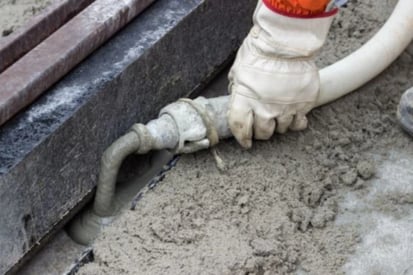
Machines
There are a couple of variables in machine costs. If grouting is what you specialise in, then purchasing your own grout pump will be the way forward. However, if you dabble in grouting or flit between different types of project, then hiring a grout pump may be the best option. Below you’ll find some of our popular grout pumps and their prices to hire and purchase.
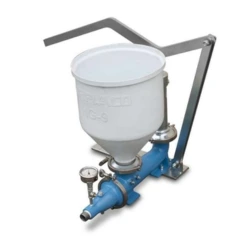
Airplaco HG-9 Hand-Operated Grout Pump
The HG-9 is a portable manual grout pump which is ideal where access is limited or there is no power supply. It has an output of up to 7 litres per minute and a pumping distance of 6m (vertically) and 15m (horizontally).
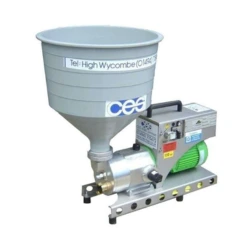
InoBEAM M8 Peristaltic Pump
The M8 is an electric peristaltic pump which is easy to clean and maintain with few wearing parts. It has an output of up to 8 litres per minute and will pump pasty products 30m and liquid products 100m.
*All pricing excludes VAT and is correct as of March 2023
Grout Pump Maintenance
To get the most from your grout pump, cleaning and maintenance are the golden rules. Some machines will require more maintenance than others. If your machine has many moving parts it really requires thorough cleaning to ensure there is no grout on internal components. As there are different types of pumps available, attention should be paid to the areas that material passes through whether that's chambers and pistons or rotors and stators. Grout is supposed to form a strong and solid material but is not the kind of material you want on your machine so always clean out as soon as you can after a job is complete. Cleaning should only take around 15-20 minutes after use in terms of spraying down the machine and flushing through with water and a sponge ball.
Regular servicing will also keep your grout pump in the best condition possible and keep it working at the optimum level. If your pump works by rotor and stator mechanism you should replace these wear-parts when required. Diesel engines should undergo an annual service and the filters must be replaced as and when needed. As well as having a professional service from a qualified company, it is also important to carry out daily maintenance. This may include greasing seals and performing visual checks.
Contact CES Hire
If you have any further questions about airless paint sprayers, feel free to get in touch and ask away! Our friendly team of experts would be more than happy to help you.
You can get in touch via our contact us form, send us an email, or call us on 01494 715472.






